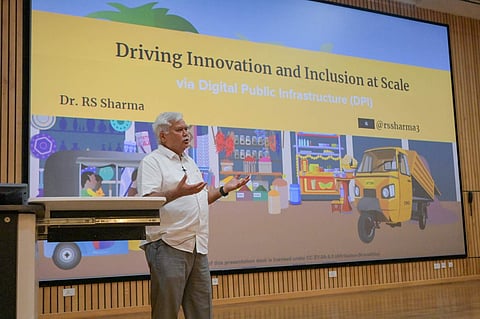

Dr RS Sharma, a visiting professor at the Indian Institute of Technology (IIT) Kanpur and a renowned figure in India's digital transformation landscape, delivered a captivating talk on India's Digital Public Infrastructure (DPI) as a part of the "Amrit Kaal -Vimarsh" campus dialogue on October 17, Tuesday. This dialogue was aimed at inspiring students and academics to contribute to a development-centered ecosystem.
Dr Sharma, an alumnus of IIT Kanpur himself, is a former civil servant who held significant public sector positions such as Chief Executive Officer of the National Health Authority and Head of the Telecom Regulatory Authority of India (TRAI). He is also recognised for his pivotal role as the first Director General of the Unique Identification Authority of India (UIDAI), where he spearheaded the creation of the Aadhaar system, according to a press release from the institute, issued today, October 20.
In his talk, Dr Sharma elucidated how India has made remarkable strides in the digital realm through the DPI approach. He explained that DPI encompasses three integral layers: market, governance, and technology standards. The market layer involves competitive players designing inclusive products; the governance layer establishes legal frameworks and public programmes to drive adoption; and technology standards, particularly for identity, payments, and data sharing, enable interoperability and shared standards.
Security is paramount in DPIs, necessitating the creation of secure pipelines for access. Dr Sharma highlighted the Aadhaar experience with Authentication User Agencies (AUAs) as an exemplary framework. End-user application certification ensures safety, exemplified by CoWin, a secure model with over a hundred connected applications, as explained in the press release.
Dr Sharma portrayed India's DPI approach as a harmonious blend of scalability, interoperability, innovation, and frugality. It represents a vision for a digitally inclusive future, resonating not only within India but also on the global stage, as evidenced by the G20 declaration.
